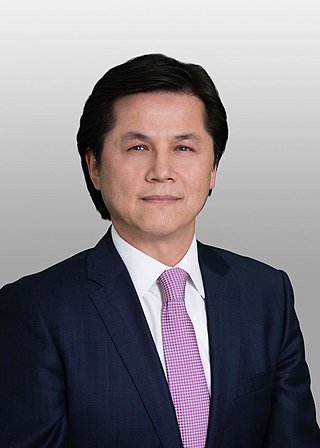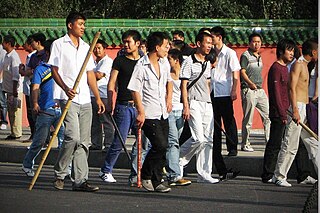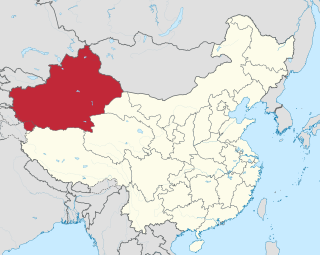Related Research Articles

The Uyghurs, alternatively spelled Uighurs, Uygurs or Uigurs, are a Turkic ethnic group originating from and culturally affiliated with the general region of Central and East Asia. The Uyghurs are recognized as the titular nationality of the Xinjiang Uyghur Autonomous Region in Northwest China. They are one of China's 55 officially recognized ethnic minorities. The Uyghurs are recognized by the Chinese government as a regional minority and the titular people of Xinjiang.
Human rights in China are periodically reviewed by the United Nations Human Rights Committee (UNHRC), on which the Chinese Communist Party (CCP), government of the People's Republic of China (PRC) and various foreign governments and human rights organizations have often disagreed. CCP and PRC authorities, their supporters, and other proponents claim that existing policies and enforcement measures are sufficient to guard against human rights abuses. However, other countries and their authorities, international non-governmental organizations (NGOs) including Human Rights in China and Amnesty International, and citizens, lawyers, and dissidents inside the country, state that the authorities in mainland China regularly sanction or organize such abuses.

Rebiya Kadeer is an ethnic Uyghur businesswoman and political activist. Born in Altay City, Xinjiang, Kadeer became a millionaire in the 1980s through her real estate holdings and ownership of a multinational conglomerate. Kadeer held various positions in the National People's Congress in Beijing and other political institutions before being arrested in 1999 for, according to Chinese state media, sending confidential internal reference reports to her husband, who worked in the United States as a pro-East Turkistan independence broadcaster. After she fled to the United States in 2005 on compassionate release, Kadeer assumed leadership positions in overseas Uyghur organizations such as the World Uyghur Congress.

The Uyghur American Association is a prominent Uyghur American non-profit advocacy organization based in Washington, D. C. in the United States. It was established in 1998 by a group of Uyghur overseas activists to raise the public awareness of the Uyghur people, who primarily reside in Xinjiang, China, also known as East Turkestan. The Uyghur American Association is an affiliate organization of the World Uyghur Congress and works to promote the Uyghur culture and improved human rights conditions for Uyghurs.

Nury Ablikim Turkel is an American attorney, public official, and human rights advocate based in Washington, D.C. He is currently Chair of the United States Commission on International Religious Freedom (USCIRF).

Huseyincan Celil is a Uyghur holding Chinese and Canadian citizenship. He was the subject of a controversial court case in 2006 when he was arrested in Uzbekistan, extradited to China against the objections of the Canadian government, and sentenced to life in prison on charges of terrorism. The conviction was based on his supposed identification with a man called Guler Dilaver, who had been wanted in Kyrgyzstan for terrorism charges.

On February 25, 1997, 3 bombs exploded on 3 buses in Ürümqi, Xinjiang, China. 9 people were killed, including at least 3 children, and a further 28 were injured. Another 2 devices in the south railway station failed to explode. Steel balls, screws, and nails were found in the bombs.

The 2008 Kashgar attack occurred on the morning of 4 August 2008, in the city of Kashgar in the Western Chinese province of Xinjiang. According to Chinese government sources, it was a terrorist attack perpetrated by two men with suspected ties to the Uyghur separatist movement. The men reportedly drove a truck into a group of approximately 70 jogging police officers, and proceeded to attack them with grenades and machetes, resulting in the death of sixteen officers.

A series of violent riots over several days broke out on 5 July 2009 in Ürümqi, the capital city of the Xinjiang Uyghur Autonomous Region (XUAR), in northwestern China. The first day's rioting, which involved at least 1,000 Uyghurs, began as a protest, but escalated into violent attacks that mainly targeted Han people. According to Chinese state media, a total of 197 people died, most of whom were Han people or non-Muslim minorities, with 1,721 others injured and many vehicles and buildings destroyed. Many Uyghurs disappeared during wide-scale police sweeps in the days following the riots; Human Rights Watch (HRW) documented 43 cases and said figures for real disappearances were likely to be much higher.

The World Uyghur Congress (WUC) is an international organization of exiled Uyghur groups that claims to "represent the collective interest of the Uyghur people" both inside and outside of the Xinjiang Uyghur Autonomous Region of the People's Republic of China. The World Uyghur Congress claims to be a nonviolent and peaceful movement that opposes what it considers to be the Chinese "occupation" of 'East Turkestan' and advocates rejection of totalitarianism, religious intolerance and terrorism as an instrument of policy. The Congress is funded in part by the National Endowment for Democracy or NED of the United States. It has been designated as a terrorist organization by China since 2003 for conspiring with separatists and religious extremists to plan terror attacks.

Ilham Tohti is a Uyghur economist serving a life sentence in China, on separatism-related charges. He is a vocal advocate for the implementation of regional autonomy laws in China, was the host of Uyghur Online, a website founded in 2006 that discusses Uyghur issues, and is known for his research on Uyghur-Han relations. Ilham was summoned from his Beijing home and detained shortly after the July 2009 Ürümqi riots by the authorities because of his criticism of the Chinese government's policies toward Uyghurs in Xinjiang. Ilham was released on August 23 after international pressure and condemnation. He was arrested again in January 2014 and imprisoned after a two-day trial. For his work in the face of adversity he was awarded the PEN/Barbara Goldsmith Freedom to Write Award (2014), the Martin Ennals Award (2016), the Václav Havel Human Rights Prize (2019), and the Sakharov Prize (2019). Ilham is viewed as a moderate and believes that Xinjiang should be granted autonomy according to democratic principles.

Dolkun Isa is a Uyghur activist based in Germany, who has been designated as a terrorist by the Chinese Government since 2003. He is the 3rd and current president of the World Uyghur Congress, in office since 12 November 2017. He previously served as General Secretary and Chairman of the Executive Committee of the congress, respectively, and has spoken on behalf of the rights of the Uyghurs which make up the majority population in that region. He has also presented Uyghur human rights issues to the UN Human Rights Council, European Parliament, European governments and international human rights organizations.

The Xinjiang conflict, also known as the East Turkistan conflict, Uyghur–Chinese conflict or Sino-East Turkistan conflict, is an ongoing ethnic geopolitical conflict in what is now China's far-northwest autonomous region of Xinjiang, also known as East Turkistan. It is centred around the Uyghurs, a Turkic ethnic group who constitute a plurality of the region's population.
On the early morning of Wednesday, 30 July 2014, Juma Tahir, the imam of China's largest mosque, the Id Kah Mosque in northwestern Kashgar, was stabbed to death by three young male Uyghur extremists. Religious leaders across denominations condemned the attack.

The Xinjiang internment camps, officially called vocational education and training centers by the government of China, are internment camps operated by the government of Xinjiang and the Chinese Communist Party Provincial Standing Committee. Human Rights Watch says that they have been used to indoctrinate Uyghurs and other Muslims since 2017 as part of a "people's war on terror", a policy announced in 2014. The camps have been criticized by the governments of many countries and human rights organizations for alleged human rights abuses, including mistreatment, rape, and torture, with some of them alleging genocide. Some 40 countries around the world have called on China to respect the human rights of the Uyghur community, including countries such as Canada, Germany, Turkey, Honduras and Japan. The governments of more than 35 countries have expressed support for China's government. Xinjiang internment camps have been described as "the most extreme example of China's inhumane policies against Uighurs".

The Chinese government has committed a series of ongoing human rights abuses against Uyghurs and other ethnic and religious minorities in Xinjiang that is often characterized as genocide. Beginning in 2014, the Chinese government, under the administration of Chinese Communist Party (CCP) General Secretary Xi Jinping, incarcerated more than an estimated one million Turkic Muslims without any legal process in internment camps. Operations from 2016 to 2021 were led by Xinjiang CCP Secretary Chen Quanguo. It is the largest-scale detention of ethnic and religious minorities since World War II. The Chinese government began to wind down the camps in 2019. Amnesty International states that detainees have been increasingly transferred to the formal penal system.

Rushan Abbas is a Uyghur American activist and advocate from the Xinjiang Uyghur Autonomous Region in China. She is the founder and executive director of the nonprofit Campaign for Uyghurs. Abbas became one of the most prominent Uyghur voices in international activism following her sister's detainment by the Chinese government in 2018.

Gulchehra "Guli" A. Hoja is a Uyghur–American journalist who has worked for Radio Free Asia since 2001. In November 2019, Hoja received the Magnitsky Human Rights Award for her reporting on the ongoing human rights crisis in Xinjiang and in 2020, Hoja received the Courage in Journalism Award from the International Women's Media Foundation and was listed among The 500 Most Influential Muslims.

The Uyghur Tribunal was an independent "people's tribunal" based in the United Kingdom aiming to examine evidence regarding the ongoing human rights abuses against the Uyghur people by the Government of China and to evaluate whether the abuses constitute genocide under the Genocide Convention. The tribunal was chaired by Geoffrey Nice, the lead prosecutor in the trial of Slobodan Milošević, who announced the creation of the tribunal in September 2020.
The OHCHR Assessment of human rights concerns in the Xinjiang Uyghur Autonomous Region, People's Republic of China is a report published on 31 August 2022 by the Office of the United Nations High Commissioner for Human Rights (OHCHR) concerning the treatment of Uyghurs and other largely Muslim groups in China. The report concluded that "[t]he extent of arbitrary and discriminatory detention of members of Uyghur and other predominantly Muslim groups, pursuant to law and policy, in context of restrictions and deprivation more generally of fundamental rights enjoyed individually and collectively, may constitute international crimes, in particular crimes against humanity." Human rights commissioner Michelle Bachelet released the report shortly before leaving the office.
References
- ↑ "China 'executes' Uighur activist". BBC News. 9 February 2007. Retrieved 1 September 2018.
- 1 2 "Muslim Executed for Trying to 'Split' China". Muslim American Society . 12 February 2007. Archived from the original on 28 September 2007. Retrieved 1 September 2018.
- ↑ "Uyghur political prisoner executed in Urumchi". Uyghur American Association . 9 February 2007. Archived from the original on 6 July 2010. Retrieved 1 September 2018.
- ↑ "Persecution of Uyghurs in the Era of the "War on Terror"" (PDF). Uyghur Human Rights Project . 16 October 2007. Archived from the original (PDF) on 31 July 2011. Retrieved 1 September 2018.
- ↑ "CHINA: FURTHER INFORMATION ON DEATH PENALTY / FEAR OF IMMINENT EXECUTION: ISMAIL SEMED". Amnesty International . 15 February 2007. Retrieved 9 May 2020.
Ismail Semed was executed on 8 February in Urumqi, Xinjiang Uighur Autonomous Region (XUAR).
- ↑ "Muslim executed for trying to "split" China". Thomson Reuters Foundation News . 9 February 2007. Archived from the original on 6 December 2007. Retrieved 1 September 2018.